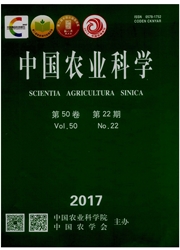

 中文摘要:
中文摘要:
【目的】研究植物交叉适应现象及其生理生化机制。【方法】以京秀葡萄(Vitisvinifera L.cv.Jingxiu)为试材,研究了38℃/10h的高温锻炼预处理和8℃/2.5d的低温锻炼预处理分别对随后0℃低温和45℃高温胁迫期间葡萄叶片细胞质膜Ca^2+-ATPase的影响。从生化水平测定了定位在质膜、液泡膜上的Ca^2+-ATPase的活性,并用氯化铈沉淀的电镜细胞化学方法,定位观察了质膜Ca^2+-ATPase的活性。【结果】高温锻炼预处理提高了微粒体膜上的Ca^2+-ATPase酶的活性,并且在随后的低温胁迫条件下,保持了酶活性的稳定性;低温锻炼提高了微粒体在高温胁迫下的ATP酶活性。【结论】高温锻炼诱导的抗冷性和低温锻炼所诱导的耐热性的提高与微粒体膜上Ca^2+-ATPase活性的变化有关,且高温锻炼和低温锻炼具有相同的调控机制。
 英文摘要:
英文摘要:
[ Objective ] The aim of the experiment is to explore the mechanism of cross adaptation to different temperature stresses in the plants, [ Method ]Leaves from one-year-old young grape (Vitis vinifera L, cv, Jingxiu) plants were used as experimental materials in this experiment. The changes of activity of plasma membrane Ca^2+-ATPase both in chilling-treated plants after heat acclimation (HA, 38℃/10 h) and heat-treated plants after cold acclimation (CA, 8℃/2.5 d) were analyzed with biochemistry assay and electromicroscopic-cytochemical assay in which cerium trichloride (CeC13) precipitation method was adopted. [Result] The plasma membrane Ca^2+-ATPase activity was increased by HA or CA pretreatments. There was no obvious change in tonoplast Ca^2+-ATPase activity after HA or CA, However, the stability of Ca^2+-ATPase was enhanced under the subsequent cross-temperatures stresses, and the activity was always kept at higher level than that of control. [Conclusion] This result from biochemistry assay agreed with the observation through the electro-microscopic technology, which suggested that plasma membrane Ca^2+-ATPase was involved in the chilling resistance induced by heat HA and the thermotolerance of grape plants induced by CA and almost had the same regulating mechanism.
 同期刊论文项目
同期刊论文项目
 同项目期刊论文
同项目期刊论文
 期刊信息
期刊信息
